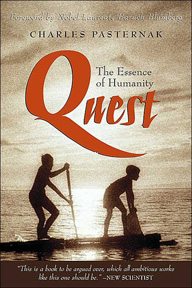
Quest: The Essence of Humanity
Charles Pasternak and Baruch Blumberg


Description
From The Publisher:
An intriguing work of history, philosophy, and popular science that explores the human desire to quest.
Scientists continually look for the genetic factors that make humans so very different in appearance and behaviour from most animals - the genes that are uniquely human. Respected biochemist and author Charles Pasternak argues that such genes do not exist. Instead, he suggests that it is our desire to quest - for food and shelter, for knowledge, for wealth, for adventure - coupled with our unique physical abilities to do so that have controlled our evolution and have led humans to develop away from closely related animals.
In this intriguing work of history, philosophy, and popular science, Pasternak uses his extensive biological knowledge to discuss man's nature and achievements, his genetic makeup, and his evolution.
For years science, philosophy and religion have sought to find the single factor that makes humans different from other animals. Many confidently expected to find a human gene - a single element possessed by no other animal that made us unique. Charles Pasternak believes that such a gene does not exist. Humans differ from other primates only in small changes of genes that are common to both.
Pasternak argues that it is the heightened ability of humans to quest beyond their immediate needs that has driven human development. The upright human posture, together with physically skilful hands, a sophisticated vocal cord and three times as many cortical neurons as a chimpanzee, have put humans in their highly advantageous position.
This thoughtful work spans science, philosophy, religion and the arts, to examine the past and the future of the human race. --This text refers to the Hardcover edition.
This epic work spans science, philosophy, religion and the arts to examine the past and the future of the human race.
From Homer to Star Wars humans have been driven by quest. Since we first walked humankind has sought beyond basic needs and personal comfort for knowledge, for wealth and for adventure. We climb mountains because they are there, study and experiment for the sake of knowledge and have voyaged to the moon and beyond. In this epic work Charles Pasternak argues that it is precisely this propensity for quest that has made humans unique and led to our domination over other species.
Quest traces life on earth from primitive cells through ancient civilizations and the great artists, scientists and explorers of the past, to the forefront of genetic experimentation today. The author argues that it is not any single genetic difference that has differentiated us from other animals but a combination of very subtle changes that have enabled man to exercise a greater ability to quest. He believes that a weakening in the exercise of the instinct to quest among the western nations will lead to a decline in their influence, relative to those of eastern populations such as China and India, south east Asia and Japan.

Reviews
"An excellent new book .... as wide-ranging as the human species itself, skipping from DNA to Minoan civilization to GM crops in search of evidence."
—Newsweek
"One of the most thought-provoking books to come my way for some time."
—Sunday Telegraph


Reader's Index
Send us your favorite quotes or passages from this book.

About the Author
Charles A. Pasternak is a biochemist and founding Director of the Oxford International Biomedical Centre. His previous academic experience has included research and teaching posts at the universities of Oxford, London (St George’s Medical School), Yale and California (UCSD Medical School). While at St George’s Medical School, he was founder and Chairman of the Department of Biochemistry, which he later expanded into the Department of Cellular and Molecular Sciences.
Charles Pasternak is acclaimed for his pioneering work in membrane research and is a tireless promoter of international collaboration, working with UNESCO, IUBMB and universities worldwide. He is the author of a number of books and is editor-in-chief of a scientific journal. He has recently turned his attention to communicating scientific subjects to a broader readership.
Charles comes from a highly talented family. He is nephew of Boris Pasternak, author of Doctor Zhivago, and grandson of Leonid Pasternak, the Russian Impressionist painter.

Table of Contents

Customer Reviews
Write your own online review.

Look for Similar Books by Subject
  |


